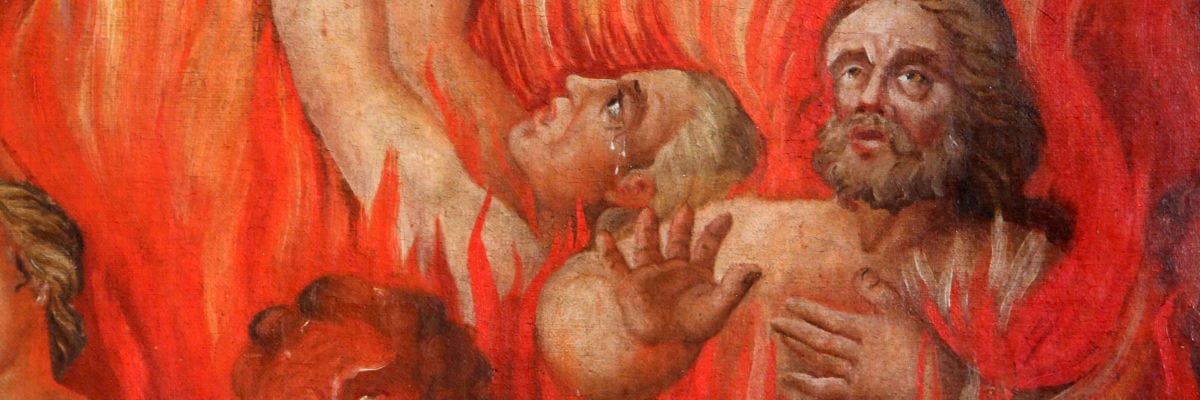
Cy Kellett is joined by Catholic apologist Jimmy Akin regarding Pope Francis’s comments on hell. Jimmy dives into the theological implications of universalism and the reality of hell, addressing the concerns raised by professors and the broader context of Church teaching.
Transcript:
Caller: Locally, here in Detroit recently, the Archbishop dismissed three seminary professors. There was no public comment, but apparently it was because of comments they made about the late Pope Francis questioning his teaching.
I’ve looked into this a little bit, and I’m a little taken back by the dismissals because none of the comments that they made publicly seem to be, you know, in dissent or heresy. One of them was really about the doctrine of hell. Pope Francis had made some comments about he had hoped that hell was empty. When he was asked for clarification, there really wasn’t much clarification.
So what is the view of apologists?
Jimmy: I don’t speak for all apologists. I don’t even speak for all Catholic apologists. And frankly, apologists have different opinions about hell. Some apologists are very convinced that hell exists and that people really go there. Other apologists are hopeful that hell may be empty and that maybe some people have really long purgatories, but ultimately everybody makes it to heaven.
I know apologists of both stripes and I know theologians of both stripes in terms of the ultimate population of hell. This is something that I would point Steve and other interested parties to a work that was written by Cardinal Avery Dulles a number of years ago called *The Population of Hell*. He goes through the various arguments of those who are convinced that hell is real and that people really go there.
He also goes through the arguments of what are sometimes called hopeful universalists, meaning people who would say, well, I can’t assert that hell is empty, but I could hope that hell is empty. I wouldn’t be quick to dismiss that as an unacceptable opinion in Catholic circles, because Hans Urs von Balthasar, who was a hopeful universalist, was appointed by John Paul II as a cardinal precisely because of his theological contributions to the Church.
So when you have John Paul II appointing someone as a cardinal because of his theological contributions and one of his ideas is hopeful universalism, that means we shouldn’t be too quick to say, oh, this is incompatible with the Catholic faith.
Now, my own personal view is, although I would love hell to be empty, I think that there is a basis for saying that hell is real and that at least some people go there. I’m cautious about who that is. As both John Paul II and Benedict XVI said, the Church has not taught any specific individual is in hell, not even Judas.
You might think that Judas is in hell based on Jesus’s comments about Judas, but those comments presuppose that Judas never repented. And Matthew is explicit in saying Judas repented. So I agree with Pope Benedict that rather than insert ourselves into God’s place, we have to leave the fate of Judas open to God and entrust that question to him, because ultimately we don’t have the data needed to settle it conclusively.
But other apologists are going to have different opinions. Some are going to say Judas is definitely lost. Others are going to say Judas is definitely saved. The opinions among apologists aren’t in principle different than the opinions among other Catholics who study these issues and try to figure them out.
So I would say there is a diversity of opinions here. But I would also say that even though I think there is significant evidence from Scripture for the idea of people going to hell, there is also reason to not say that’s mandatory for the Christian faith.
What Cardinal Avery Dulles does in his piece *The Population of Hell*, which was published in *First Things*, and you can find it online if you just search for Avery Dulles, *Population of Hell*, what he ends up concluding is we don’t know what the proportion is of people who go to hell versus the proportion of people who go to heaven.
He thinks that’s a good thing. Avery Dulles, by the way, is another theological cardinal, that is someone who was appointed a cardinal because of his profound theology. But he concludes it’s a good thing that we don’t ultimately know the answers, because if we knew that only a very few people make it to heaven and a large majority of people go to hell, we’d be tempted to despair of going to heaven and not even make the attempt.
Whereas if we knew the reverse, if we knew that a very large number of people go to heaven and only a tiny number go to hell, we’d be tempted to get presumptuous. And it’s neither good for us to be presumptuous nor to despair.
So actually, not knowing the answer to this question provides a kind of healthy motivation for us to take the possibility of being lost seriously and thus avoid mortal sin, while simultaneously not being tempted to utterly despair and give up.
Cy: Steve, thank you very much for the question. I hope that that was a helpful answer to you.
Lines full, off we go now to Cleveland, Ohio, where Caden is listening on AM 1260.



